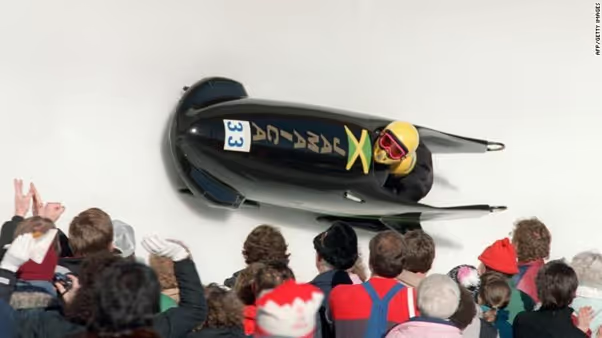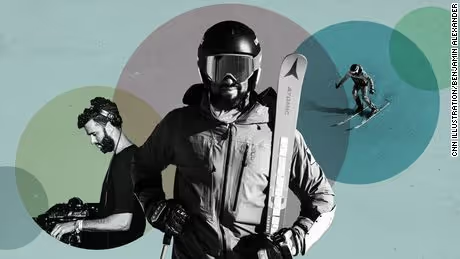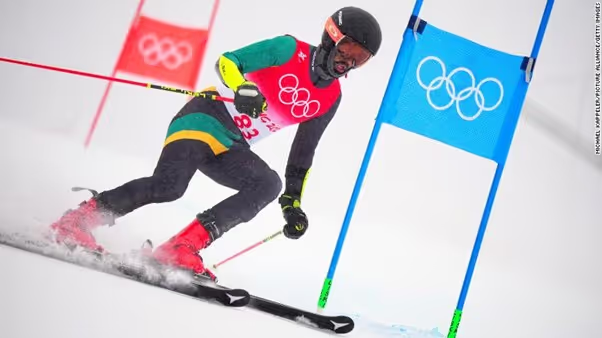.png)
Though the four man team crashed and received a "Did Not Finish" result, the exploits of Dudley 'Tal' Stokes, Michael White, Devon Harris and Chris Stokes were immortalized in the 1993 hit, which remains one of the highest grossing sports comedies.
Now, perhaps more importantly, the team have inadvertently inspired generations of Jamaican winter sports stars.
"People watch 'Cool Runnings' and they're very influenced in a lot of ways," Tal Stokes told CNN Sport.
Decades later, for the first time in Olympic history, the island nation qualified in three bobsled events -- the two-man bobsled, the women's monobob and the four-man bobsled --as well as entering its first ever alpine skier.
Jamaica's two-man bobsled team of Shanwayne Stephens and Nimroy Turgott came in last in the event, but the nation will get a second bite at the cherry this week in the four-man event.

Getting to grips with bobsled didn't come easily: "I knew nothing about the sport I was getting into," said Stokes.
Training for bobsled was a "brutal existence, from your eyes open to your eyes closed," according to Stokes, with the team having to work hard in order to reach a competitive standard with no prior experience in the sport.
Unlikely beginnings
Stokes told CNN that the 1988 team "started from zero."
The movie "Cool Runnings" came five years after Jamaica competed in the Calgary Games --but according to Stokes, the film was conceptualized by Americans William Maloney and George Fitch before he and his teammates even started competing together.
"I was told the two gentlemen had the idea. William [Maloney] wanted to march in the Opening Ceremonies of an Olympic Games. He has his bucket list and has been ticking off things all his life. And George Fitch always had in mind to do a movie," he said.
The men were both living in Jamaica at the time: Fitch was working for the US government and businessman Maloney was married to a Jamaican.
"The two of them were drinking in a bar in Kingston and saw the pushcart derby on television and struck up on bobsled."
The pair couldn't get any athletes to take up bobsled for their endeavor, so they went to the army to find potential candidates, according to Stokes.
"At the time, I was a sports fan, playing football in the army, as well as being an officer," he said.
On holiday at the time, Stokes said he got a phone call from his unit, instructing him to try out for box cart trials to test his capability for the sport.
The orders "came down the chain of command to me as an order, and I really didn't have a choice. And so I went," he said.


'A brutal existence'
Getting to gripswith bobsled didn't come easily: "I knew nothing about the sport I wasgetting into," said Stokes.
Training forbobsled was a "brutal existence, from your eyes open to your eyesclosed," according to Stokes, with the team having to work hard in orderto reach a competitive standard with no prior experience in the sport.
"[The team]was coming into cold weather. Strict, strict timing regimes in days that werestructured from start to finish on time, and just hammering away," saidStokes.
"We had tochange the culture or rather look at the culture that was successful in thesport, and which is typically a German culture," added Stokes. "Wehad to go into German mode to get things done."
A complicated legacy
"CoolRunnings" became hugely popular, grossing over $154 million at the boxoffice. But the film's commercial success had a profound impact on Stokes'life, and the happy go lucky plot starring hapless athletes didn't fullyreflect how much the real team achieved.
"'CoolRunnings' has cast a massive shadow over my life," Stokes told CNN.
"There's avery uncomfortable position of actually being alive to watch your legacyunfold," he said. "Most people die before their legacy is revealed,but I've had to live it.
"It startedwith what, you know, was really a comedy," he explained. "A lot ofwhat we did at first was comedic. But then over the years, we really becamecompetitors and operated at the very highest level. And that was a journey initself."
His sporting careerspanned four Olympic Games, during which time, he shaved significant time offhis running speed.
"My Olympiccareer was 10 years ... I went to four Games 1988 to 1998: Calgary,Albertville, Lillehammer, Nagano in Japan. So it is very, very uncommon, thatdoesn't happen."

Inspiring the next generation
Jamaica has not yetwon an Olympic medal in bobsled, but this year's four-man team, nicknamed"Fire on Ice," wants to change that -- 24 years since the nation'sfour-man bobsled team last qualified for the Winter Olympics.
This year, BenjaminAlexander made history as Jamaica's first alpine skier, after Cool Runningsjibes on the ski slopes caused him to consider seriously pursuing the sport.
"As I got goodenough to kind of ski with them socially, being the only Black representativein the group, even though I am only half Black, and being of Jamaican heritage,people kept throwing jokes, sideways jokes at me about 'Cool Runnings,' theJamaican bobsled team and, 'you should go to the Olympics,'" Alexandertold CNN Sport.
Alexander went tothe PyeongChang Games in 2018 as a spectator and started to wonder if he couldcompete at that level.
"One of thethings I noticed, other than thoroughly enjoying the spirit of the Olympics,was that there were only three Jamaican athletes in attendance.
"It took meaback knowing how strong Jamaica is in the Summer Games, knowing how popularthat movie 'Cool Runnings' is.
"I kind of hadthis idea in the back of my head: let's see if this is possible. I thought themost likely outcome was death or at least a serious injury."
In the years sincehis Olympic debut, Stokes has become more comfortable with his position insporting and pop-culture history.
"I've come toappreciate that Olympic participation is a worthy goal. Participation that'saimed not at getting a gold medal does have its place," he said.
"Most people,most athletes at an Olympic Games ... one: no medal, and two: don't get intothe finals. That's a reality.
"Life is astruggle, anything worth doing in life is a struggle. And anytime you enterinto a struggle, you are going to suffer. And the one thing I would like tocommunicate to people that people think that suffering is something to beavoided: no. That's the reality.
"What we needto develop is: how are we going to survive in the struggle and the suffering,and eventually triumph?"
Thank you CNN for the great article.
.png)
Contribute to your future, a Non Profit Organization and buy us a Coffee with 3 simple clicks and a minute of your time. Imagine what we can do together.
To thank you, we will call you personally.
This is the amount that will be distributed amongst the current shareholders.
Current Share Holders
1102/500,000